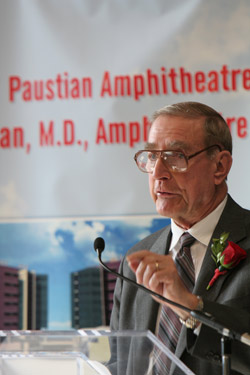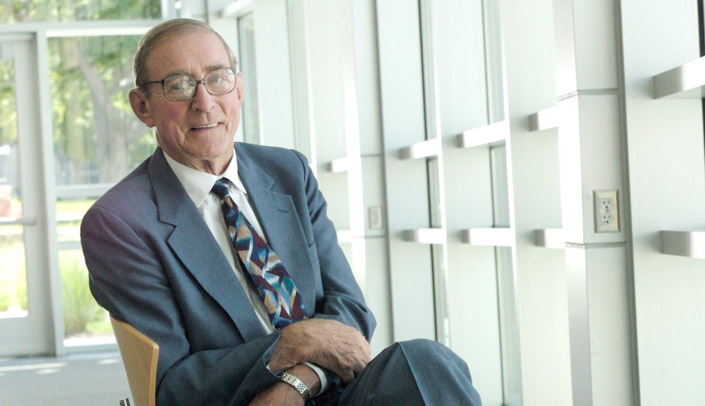
The Paustian file
- Received medical degree from UNMC in 1953; performed an internship and residency in internal medicine at the University of Pennsylvania Graduate Hospital.
- Completed two fellowships — the first in gastroenterology at the University of Pennsylvania Graduate Hospital and the second in tropical medicine and parasitology in Central America, Panama and Mexico through the Louisiana State University Medical School.
- Named assistant professor at UNMC in 1961, associate professor in 1963 and professor in 1967. From 1980 to 1995, held dual post of associate dean for graduate medical education and continuing medical education.
- Professional career included the instruction of more than 3,000 medical, nursing and graduate students.
- Helped create the first medical practice plan at UNMC, instrumental in making UNMC an attractive place for academic-oriented physicians to practice medicine.
- Thanks to a gift from Ruth and Bill Scott, the two primary amphitheaters in the Michael F. Sorrell Center for Health Science Education are named in honor of Dr. Paustian and his first wife, Mary Ann “Maisie” Paustian.
- The Frederick F. Paustian, M.D., Gastroenterology Research Laboratories are on the seventh floor of the Durham Research Center II.
- Developed programs in all aspects of post-graduate medical training for physicians, as well as outstanding training and continuing education programs for family practitioners, internists and emergency room physicians.
- Served as president of the Metropolitan Omaha Medical Society and the Nebraska Medical Association.
- Held key posts in the American College of Physicians, the Accreditation Council for Graduate Medical Education and the National Residency Review Committee for Internal Medicine.
- Received the Nebraska Medical Association’s Distinguished Service to Medicine Award.
Fred Paustian, M.D., a pioneering physician in gastroenterology who helped build UNMC into the powerhouse that it is today, died Sunday evening in Omaha after a long battle with Parkinson’s disease. He was 87.
Dr. Paustian was the first specialty-trained gastroenterologist in Nebraska. Under his leadership, gastroenterology soon became one of UNMC’s top centers of excellence.
He recruited Michael Sorrell, M.D., as one of his GI fellows, and later Rowen Zetterman, M.D. Both became leading experts on liver disease in U.S. and were key players in the formation of the liver research unit and the eventual recruitment of the liver transplantation team in 1985.
|
|
“Fred was a real pioneer, one of the first full-time members in the department of internal medicine,” Dr. Sorrell said. “He introduced rigorous medicine into the teaching environment. He was very analytical, and he took all the toughest cases. He was an all-round physician-scholar who wrote in all the key journals.
“He was very demanding, but fair. He would never ask you to do something that he wouldn’t do himself. He was a marvelous man, who was very loyal to the university and instrumental to its growth. He led by example.”
Dr. Paustian provided complex gastroenterology care for both adults and children — during approximately the first 20 years of his practice, there were no pediatric gastroenterologists in Omaha.
Dr. Paustian’s love for the university was demonstrated in his philanthropy, said John Niemann, Ed.D., senior vice president of the University of Nebraska Foundation. Dr. Paustian donated $1 million to establish an endowed chair in gastroenterology. In addition, he donated another million dollars to support a research fund in gastroenterology.
“Everything Fred did, he did for gastroenterology,” said Dr. Niemann, who noted that Dr. Paustian established a total of five funds. “Fred was a friend to many and admired by all. He was scholarly, a lifelong learner. Even after he retired from active practice, he would continue to go to Grand Rounds.
“He was unpretentious, one of the guys. He was one of the early gentlemen of medicine at UNMC — a graduate who became a legend and taught generations of students. His impact can’t be overstated.”
Visitation will be held from 4 to 6 p.m. on Thursday at Roeder Mortuary, 2727 N. 108th St. The interment service will be at Forest Lawn Cemetery at 10 a.m. on Friday followed by a memorial service at Dundee Presbyterian Church, 5312 Underwood Ave., at 11 a.m.

Rest in peace and thank you for your friendship. You will be remembered.
Dan McQuade
Dr. Paustian was my physician for a time. He was very kind. Instead of some office visits, he scheduled a time on a weekday evening for me to call him so he could check on my progress. You don't get service like that too often! No wonder he kept such long hours.
Dr. Paustian was an outstanding supporter of the Gastroenterology & Hepatology Division long after he left his medical practice. He has left a great legacy and will be greatly missed.
Fred had very high standards for academic discipline and clinical exactness, traits we all value, not only in those we trust with our health and lives, but also in teachers we trust to educate new generations of doctors. He could also be a little hard to please. Not long after I arrived at UNMC, he asked me to see a patient with a large abdominal aortic aneurysm. I politely explained that I wasn’t a vascular surgeon. “You’re a surgeon, aren’t you?” he said. "Any decent surgeon ought to be able to take care of that.”
DEAN PARKS 5 Nov. 014 (CLASS OF 63)
Fred was a mentor , but also a cherished friend. We shared many happy hours hunting pheasants in the Iowa hills as well as many friendly hours at after hour social events.
He and Dr. Mike Sorrell are two of the most memorably important physicians from my time at UNMC. Nick Workhoven, M.D., 1968
While it is sad that Fred passed on, it was quite pleasing to read of the outstanding life of service of a classmate! Thank you for sharing the heartwarming story of his career, an inspiration to younger generations.
Howard Hague, class of '53
Dr. Paustain was a amazing man whose passion for education and patient care is legendary. He was remarkably consistent in his professional life and his wonderful example persists today in his students. A leader whose strength with kindness were unique.
I can imagine how happy Maisie is to have you in Heaven with her for eternity. You took such wonderful care of our family for so many years for which we were most grateful. Jean Korff
There was never a doubt that one would voyage into success in medicine if the ethics and guidelines of "Dr Paustian" were always foremost in one's actions! For his example I offer thanks and wish him the traditional Navy words used at deployment, "Fair winds 💨 and following seas! 🌊 !" Godspeed!
Captain Douglas W. Peterson (MC) U S Navy, Ret
Fred Paustian is one of the few people who I can point to as definitely making a difference in my education and career. As a medical student, his gastroenterology rotation was one of my favorites. I never really feared working with him. On Fred's service, you knew exactly what was expected of you–you were going to do a thorough H & P (still the most important "test" in all of medicine), you were to know the results of all of your patients' tests, you would review all of you patients’ films, and you were going to struggle along on rounds in the evenings until the work was done.
I did my internship and first year of medicine residency at Virginia Mason Hospital in Seattle and wanted to stay there for the last two years, but another resident was chosen over me. At the time, I felt bad about this, but as I reflect back, this was one of those "lemons to lemonade" occurrences since I was able to complete my IM residency at Nebraska. I worked hard in those last two years and studied hard for my boards and hadn't looked for a place to practice by the time my IM residency was completed. It turned out that one of the two GE fellowships hadn't filled that year. It was offered to me and I accepted–one of the best decisions I have made in my life.
Fred was still the Chairman of the Department of Gastroenerology then, so I was under his wing for the next two years. The most important thing that Fred instilled in me is what I call his "bulldog" approach to diagnosis–you simply bit onto the problem and you didn't let go until you had a diagnosis or had exhausted all diagnostic avenues. There are often situations in medicine that are difficult to address or are easier to ignore–alcoholism in a denying patient or the mildly elevated lab result, for example. Fred taught me just to buck up and address them.
Nebraska's GE program didn't have much of a reputation when I was there, but I think Fred and the other members of his department gave me about the best education in clinical gastroenterology and liver disease that was available. Fred had trained under Henry Bockus and his experience treating inflammatory bowel disease was aggressive and at the cutting edge for the time, and I absorbed his approach and subsequently applied it successfully to my own patients. Fred was one of the few people who understood that abdominal pain could be either visceral or somatic and that knowledge has helped me and numerous patients immensely.
Fred recruited Mike Sorrell who had completed a liver fellowship a year before my GE fellowship began so I was fortunate to study under him as well. For a number of years after my fellowship, I'd be at a meeting and people would ask where I had trained. I'd tell them "Nebraska" and could see that they were not impressed. That all changed after Nebraska's liver transplant program got going and for a while was the second largest transplant program in the nation. Since then, I've gotten respect when I say "Nebraska." And none of this would have been possible were it not built on the strong foundation of the department that Fred built. I have been, and will always be, grateful to Fred.
Without any fear of being corrected I will point out that it was way more fun sending him complex patients as compared to being his resident. Twice during my nine years practicing in Scottsbluff Nebraska we flew patients down by fixed wing, people trying to die from vague GI complaints. In both cases Dr Paustian found the problems, got surgical help to fix the problem and communicated about the cases. I can only hope that I have done the same for my patients.
W Scott Carpenter MD UNMC 79 and 82.
Dr. Paustian came to UNMC during my last year there (1959-60) and I remember him as an outstanding teacher. Something that still sticks in my visual memory is watching him perform an esophago-gastrostomy with a rigid, straight scope. I still marvel that it could be done. In the subsequent years I have met and worked with many outstanding physicians, but none has outshown Fred Paustian.
Maurice Skeith 1960
I was a Gastroenterology Fellow at Nebraska from 1989-1992. I learned much from Dr. Paustian. He was dogged and thorough in his approach to medicine and teaching, in an "old school" way. He was an excellent teacher, and that teaching continued in his rounds that lasted until 11 pm. He has touched the lives and careers of generations of trainees.